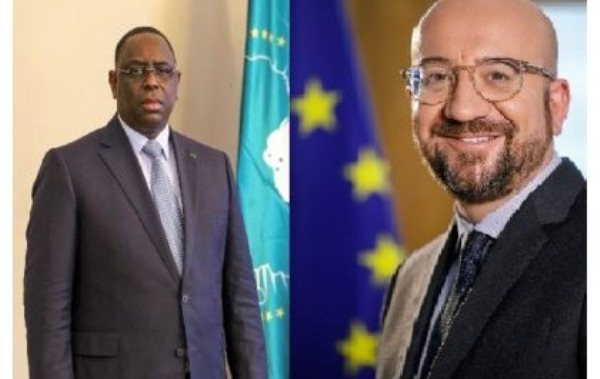

Macky Sall(left) and Charles Michel
On 17 and 18 February 2022, the Heads of State or Government of the African Union and the European Union will meet for a summit in Brussels. The last AU-EU summit took place over four years ago, in November 2017, in Abidjan.
The pandemic is of course one of the reasons that so much time has passed since our last meeting. It further reinforces the exceptional dimension that both parties wish to give to this summit. The aim is nothing less than to jointly lay the foundations of a renewed partnership between our two continents, a fresh start that has been in the making for some time now. Growth, shared prosperity and stability are the main objectives of this partnership. Our summit will be based on two fundamental principles.
Respect and values
Our two continents and their peoples share geographic proximity, languages, and human and economic ties. The peace and security of our two continents are interdependent. That is why the first fundamental principle must be respect. The future requires us to accept and respect our differences.
The second fundamental principle is the rights and values of dignity, freedom and solidarity, exercised within the framework of the rule of law and good governance. On this common ground, we can learn from each other every day.
Finally, our project is based on common interests. At its heart is a prosperous, stable, secure and sustainable Africa which is fully capable of facing all the challenges of the future.
A partnership for prosperity
A partnership calls for exchange and sharing. Each of our two continents has enormous potential to contribute to this joint project.
The EU will provide public and private investment capacity, as well as expertise with the green infrastructure and technologies that are vital to our common fight against climate change and to transforming African economies.
Africa has vast natural resources, a young and dynamic population just waiting to step up, and an impressive capacity for innovation and invention.
It also needs better access to resources, including through the reallocation of special drawing rights on a voluntary basis, in order to finance its massive economic and social development requirements.
In the same vein, a debt relief initiative for poor countries should be put in place to support the resilience and recovery efforts of African countries.
We also call for a fair and just energy transition which takes Africa’s specific needs into account, in particular industrialisation and universal access to electricity. More than 600 million Africans still do not have access to electricity.
A partnership for stability
Peace and security will also be key priorities for our strengthened partnership. The threats are becoming increasingly transnational and complex. They are a problem for all of us in whatever form they take, including cyber-attacks and hybrid attacks.
We must continue to address these common threats together, including in Africa, and in particular in the fight against terrorism.
We must continue working together, under the aegis of the African Union and the European Union, to better coordinate our efforts in this joint fight against a common enemy. Addressing this major challenge means beginning with the root causes, instability and radicalisation, in order to reach a long-term solution to the crises and build a real and lasting peace.
Tested by the pandemic
The pandemic has highlighted our common vulnerabilities, our interdependence, and therefore the need to act together and in concert to tackle it and to better prepare ourselves for possible future health crises. Defeating COVID-19 remains an immediate priority.
Europe has been working since the outset to organise and fund international solidarity on vaccines, in particular through the COVAX initiative. The EU and its Member States have so far provided almost 400 million doses worldwide, more than 85 % of them through COVAX.
Having delivered more than 130 million doses to Africa, the EU is one of the continent’s biggest donors. The EU is also stepping up its support for vaccine administration, since the biggest challenge of increased supply will be to put in place vaccination plans.
Going beyond solidarity on vaccine donation, a challenge that we must face together is the production of vaccines and other medical and pharmaceutical products in Africa to meet the continent’s basic needs. We welcome and support the projects already under way on the continent.
The key is to take a practical approach: identifying and addressing obstacles and barriers to delivery, storage and administration of vaccines, and, of course, accelerating the development of local vaccine production capacity in Africa, by Africa and for Africa.
Finally, we are convinced that international solidarity on pandemics and major health crises must be organised in a comprehensive, multi-sectorial and inclusive manner. We proposed and have actively promoted the idea of an international treaty on pandemics. These joint efforts by Europeans and Africans led to the World Health Assembly’s recent decision to open negotiations on a draft treaty, which is expected to be concluded in March 2024.
An arc of peace
Our world is seeing a growing threat of conflict between blocs. In the face of this disturbing trend, we are convinced that Africa and Europe can work together to bring about a better and safer world for everyone, through dialogue and cooperation with respect for one another.
It is in that spirit and with those goals that Africans and Europeans are rolling up our sleeves to work towards an exciting common future. (End)
